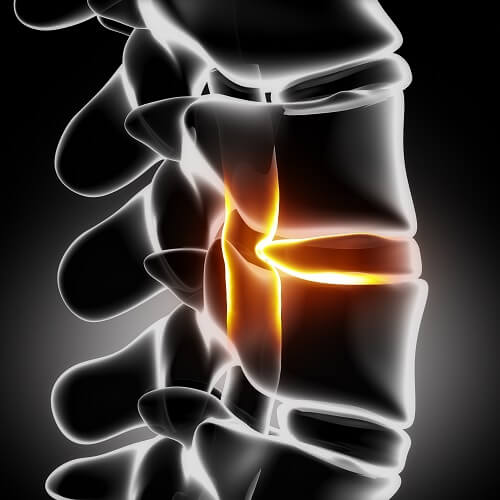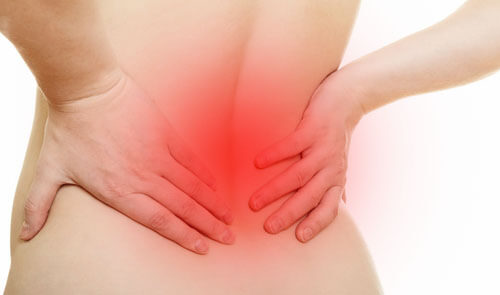Symptoms of a Herniated Disc
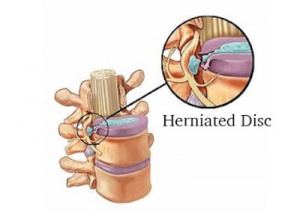

Written and verified by psychologist Valeria Sabater
Have you ever had a slipped (herniated) disc? If you have, you know it is a painful and crippling problem. If you haven’t, then knowing how to identify the symptoms of a herniated disc will serve you well. Your spine is a puzzle of complicated anatomical pieces: bones, muscles, and ligaments. If any piece of the puzzle is out of place or damaged, it can cause serious problems. Read more to find out why…
Causes and symptoms of a herniated disc
1. What is a slipped disc?
What are these discs in my spine that cause me so much pain and discomfort? The discs of tissue between the bones in your spinal column have a soft interior and a hard exterior covering. They act as shock absorbers and adapt themselves to any movements you make. Sometimes these discs tear, which causes the soft tissue to be released. This herniated tissue can put pressure on the nerves and cause pain. It also means that the disc loses its shock absorbing abilities.
2. Why do we get herniated discs?
Herniated discs become more common as you age. Your older spine is stiffer and less flexible. Wear and tear can also cause tears in the ligaments that surround the discs. The spinal discs also become stiffer because they basically dry out and start to break down. If you are in pain and you don’t know why, this might be the cause. Make sure you know the symptoms of a herniated disc so you can more easily identify the problem.
You might like: The Relationship Between Your Spine and Organs
3. Symptoms of a herniated disc
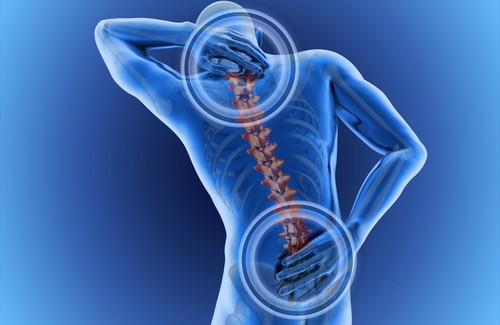
If you have pain or tingling in your legs, they fall asleep a lot, or they feel very heavy, it is possible that you have a herniated disc in your lumbar area.
If you have discomfort in the middle of your back, it could be a herniated dorsal disc. Lastly, if you notice tension and pain in your neck or even in your arms, it is possible you have a herniated cervical disc.
- Herniated cervical disc symptoms: neck pain, neck stiffness that prevents side-to-side movement, or neck cramps that go down to your shoulders and arms. You may also experience nausea or fainting. It is also very common for your arms and hands to fall asleep at night. You may have difficulty lifting weights. You feel weak suddenly and you drop things. These symptoms can be incapacitating.
- Herniated lumbar disc symptoms: In this case, the pain will be located in the lower area of your back. You will feel a strange burning or strong heat that makes you keep your back very straight, almost rigid. Muscular stiffness and cramping can even reach your legs. This is what we call radiating pain or sciatic pain. There are many people that say that they sometimes feel pain, tingling, or weakness in their feet. In extreme cases, a herniated lumbar disc can cause incontinence. If this happens to you, you should see a doctor immediately.
What is radiating pain?
- What does that mean? Radiating pain is when you have a hernia in a certain part of your body but the pain is somewhere else. An example would be having a hernia in your back but feeling pain in your legs. It is a problem that is centered on a vertebral disc. It is very common to have pain in your glutes, a burning that extends from your behind to the inner part of your leg. This can be an indicator of radiculopathy. If you experience any of these symptoms, see a doctor to get an accurate diagnosis.
4. When Should I See a Doctor?
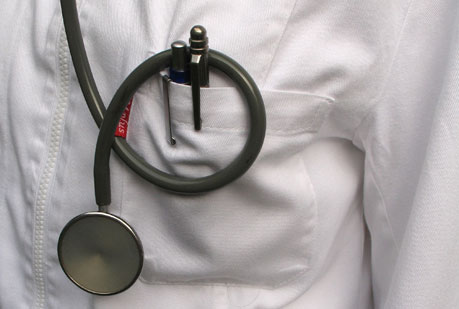
The symptoms of a herniated disc of any kind will prevent you from leading a normal life. You won’t be able to walk normally, work, or lift anything. You will have difficulty sleeping and it will be hard to sit down on a chair.
Read more: Stop Insomnia with These Homemade Juices
If these symptoms last for two straight weeks, see a doctor so that they can properly diagnose you.
Doctors say you should go to the emergency room if you experience urinary incontinence or uncontrolled sphincters. If a hernia is making your normal body functions difficult, that’s a sign of something quite serious that needs medical attention.
Slipped discs generally need surgery. But don’t worry, they can be cured successfully and you will be able to go back to your normal life. Pay attention to the symptoms and pain. Don’t hesitate to ask your doctor about anything out of the ordinary. Your body will thank you.
All cited sources were thoroughly reviewed by our team to ensure their quality, reliability, currency, and validity. The bibliography of this article was considered reliable and of academic or scientific accuracy.
- Herniated Disk in the lower back. American Academy of Orthopaedic Surgeons. (2014)
https://orthoinfo.aaos.org/es/diseases–conditions/hernia-de-disco-en-la-columna-lumbar-herniated-disk-in-the-lower-back/ - Herniated disk in the lower back. (2012). Retrieved from
orthoinfo.aaos.org/topic.cfm?topic=a00534 - Herniated disk. Mayo Clinic Staff. (2010).
mayoclinic.com/health/herniated-disk/DS00893/METHOD=print - What is a herniated disk? (2014)
familydoctor.org/familydoctor/en/diseases-conditions/herniated-disk.html - Rivero Torres, R., & Álvarez Fiallo, R. (2004). Hernia discal lumbar: algunos aspectos del diagnóstico. Revista Cubana de Medicina Militar, 33(2), 0-0. http://scielo.sld.cu/scielo.php?script=sci_arttext&pid=S0138-65572004000200003
- Allut, A. G., Zabala, A. B., Rumbo, R. M., González, A. P., & González, M. G. (1995). Hernia discal cervical intradural. Revisión de la literatura y aportación de un nuevo caso. Neurocirugía, 6(1), 60-64. https://www.sciencedirect.com/science/article/pii/S1130147395708089
This text is provided for informational purposes only and does not replace consultation with a professional. If in doubt, consult your specialist.

